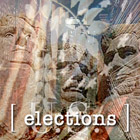
|
DEMOCRATS > Kerry REPUBLICAN > Bush GREEN > Undetermined INDEPENDENT > Nader
|
NEW HAMPSHIRE POLLS SHOW ROLLER-COASTER RACE
26 January 2004 New polling data from New Hampshire shows an uncertain primary climate, with figures wavering according to poll-questions, sample populations and methods. One of the more reliable polling organizations, Zogby International, shows Howard Dean recovering from a week of media-borne setbacks, closing gap with Kerry. Other polling organizations show Kerry with comfortable 11 or even 18 percentage point lead among "likely New Hampshire Democratic primary voters".
The issue most cited by poll takers and by analysts in the last days has been "electability", i.e. which of the Democratic candidates stands the best chance to defeat the incumbent Bush in November. Appearing to highlight this issue, the Gallup poll is now receiving broad coverage, including by cosponsor CNN, and shows John Kerry with a lead of 11% among likely voters.
The "electability" question has burst forth in the wake of Howard Dean's Iowa pep-talk to his supporters, seen by many as exaggerated, emotional and "unpresidential". Yet the above cited Gallup poll indicates that 69% of those polled thought the scream had no bearing on Dean's ability to serve as president. That's two to three times the number that express support for Dean himself, suggesting that reports of voters changing camp due to the scream are anecdotal at best and most likely stem from the Iowa loss, not the intensity of a rally speech.
On the note of electability, a new Newsweek poll now shows Kerry beating even Bush in a hypothetical election. The poll shows Kerry winning 49% against Bush's 46%. The Boston Globe cites a Reuters/MSNBC/Zogby poll released on Sunday as showing a 7% advantage for Kerry. Comparing with Monday's Zogby tracking poll, the tracking polls show Dean gaining significant momentum, probably among undecided voters, as the race goes to the wire.
The Sunday Marist University tracking poll shows Kerry with a 13% lead. But another Marist poll, released late Monday evening, showed the lead shrinking to 9% (Kerry's 36% to Dean's 27%). The Quinnipiac national poll also shows Kerry with a 13% lead over Dean, and gives Kerry the best chance to beat Bush. Some reports have said the Democrats are really racing for second, with Kerry's victory assured, though the Zogby poll would suggest a tight race impossible to predict. The University of New Hampshire has a different set of numbers, showing Clark and Edwards in competition for third place.
So, as the day of the New Hampshire primary approaches, the first vote now just hours away, the polls appear to be all over the place, with the key question being: Is Kerry's lead secure, or is the race another "statistical dead heat", as suggested by the Zogby poll? In fact, New Hampshire voters have a habit of surprising analysts and pollsters. In 2000, polls showed a close race between McCain and Bush, while McCain won the state's primary by a shocking 19%, sending the Republican primary race into a rush for subsequent states, including aggressive party maneuvering in South Carolina and a rash of fresh character attacks against McCain. As polling has taken center-stage in election coverage, often overshadowing the words, proposals and records of the candidates themselves, the quest to affect pre-election sentiment has become more fierce. This year appears to present the most extensive spending for political advertising yet seen in American politics. NPR reported that George W. Bush's campaign, taking advantage of industry "bundling" of donations, has raised three times as much preliminary capital as previous record-holder Bill Clinton, and critics say campaign finance legislation has only served to open more avenues for corporate involvement. Howard Dean, when asked about the possibility that such money would be used for "dirty tricks" to undermine a Democratic opponent in the fall, indicated that some such mischief may already have begun. He did not specify, but aides reportedly told the press that counterfeit e-mails had been sent, purporting to be from the Dean campaign, and using offensive languages, while anti-Dean phone calls had been placed to primary voters, appealing to anti-semitic paranoia. Campaign identity theft may be a new tactic, but the crucial question is whether daily polling offers a genuine service to the voter, or whether it poses a distraction to citizen and to candidate. Tomorrow, New Hampshire will decide for itself, and the pollsters will move on to other states, and their assertions may well be forgotten, as new numbers pour in.
|
||||||||||||||||||||||||||||||||||||||||||||||||||||||||||||||||||||||||||||||||||||||||||||||||||||||||||||||||||||||||||||||||||||||||||||||||||||||||||||||||||||
|
|||||||||||||||||||||||||||||||||||||||||||||||||||||||||||||||||||||||||||||||||||||||||||||||||||||||||||||||||||||||||||||||||||||||||||||||||||||||||||||||||||||








